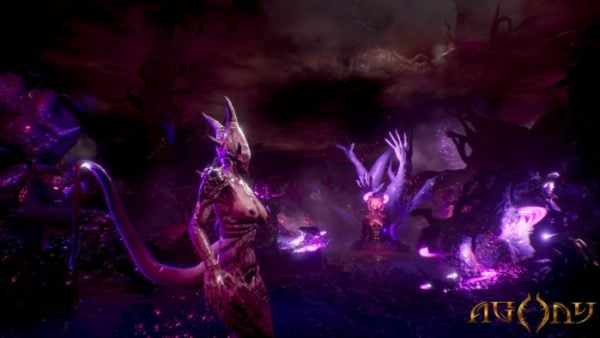Agony on PC
I take no pleasure in writing this review. I feel this way for a couple of reasons. One, because yes, Agony isn’t very good and I took no pleasure in playing it. But, more importantly, two: it’s because I had really high hopes for it, and those hopes were very quickly dashed after starting to play Agony. I wasn’t a backer of its Kickstarter, but I had followed the game quite closely for some time now, and I loved its vision. A survival horror game set in a brutal, metal AF depiction of hell. Something that even your most fire and brimstone loving priest couldn’t think up.
Agony succeeds in depicting hell in a unique way we’ve never seen before. This is just about the most horrifying take on the underworld that I’ve ever seen in a video game. Blood-curdling screams echo through the hallways, bodies are strewn around in filth, terrifying demons stalk you and make you regret your mistakes with a gory death. So if that’s the kind of stuff you wanted to see, mission accomplished there. Aside from nailing the setting, just about every other aspect of Agony is either not fun, boring, unpolished, and as a result, the game at times can feel borderline unplayable.
Agony takes pride in being a non-linear, difficult survival horror game where you are outmatched. You’re in hell after all, hell has demons, and you’re just a lost soul. After an impressive opening cutscene, you’re dropped off in hell with no memory of what got you there, and your only clue is to find a mysterious Red Goddess who appears to be the person in charge around here. Agony is not Doom, you are not equipped to handle what you’re going to come across, so most of the game will consist of trying to carefully, and quietly, get around where you need to go. You can work your way up better, more powerful beings though through a possession feature which allows you to take control of more feeble, and weak-minded citizens of hell than yourself. The problem is, features like that are so poorly explained, and the game wastes no time in punishing you.
Sticking with the example of possession, from what I gather, by design, you’re going to die a lot, but in death, you can search for new souls to possess to keep your drive to your objective alive. But for this, and so many other parts of the game, there’s no clear explanation given that adequately describes how this seemingly very important mechanic works. You interact with whatever you want to possess by pressing E, and then lines just start shooting around and you’re supposed to keep a clear line of sight between you and the demon/denizen. However, camera angles work against you, I’ve had times where I couldn’t move my camera around (a glitch I guess) to keep that line of sight, and even if I did all of that, I’d fail and still be left in the dark about why it didn’t work and what I need to do to get to the point where it will. I eventually figured it out sort of, but only out of necessity for this review. I would have given up on Agony way sooner otherwise.
Plus, on top of that, you have a very short window to possess anyone, and if you fail, it’s back to the checkpoint. What would have been neat is if you could avoid certain traps by using death to find shortcuts, but alas, a lot of the possessable citizens have hoods on their head, and while they are in that form, they cannot be taken over. You have to physically unhood these people which means you have to actually get to them first.

Early on, when you’re trying to just get a handle on what the game even wants you to be doing, you’ll be forced to lurk through corridors filled with enemies that will kill you instantly. The design of these areas is terrible to say the least. Enemy patrols seem too mindless, and often I’d be stuck waiting around in boredom for a pack of demons that decided to gaggle together in an area where I needed to go and never really leave, or give me a clear opportunity that I felt safe enough to make a break for it.
You can do things to distract them and get their attention, like throw a torch, but it never felt that helpful. I have to get dangerously close to even get that to “work,” and my feeble arms can barely even toss the torch where I wanted it to go. I died so many times trying to get a handle on what the game wanted me to do, that I eventually gave up and decided to just patiently wait until I had at least a low chance of survival while sneaking by instead of zero percent chance when trying anything else.
Deaths as a result always feel unfair in Agony, and I never learned anything from them. Whenever I thought I was starting to actually make some headway, I’d get blindsided out of nowhere and sent back from where I came. In a game where there is zero handholding, I should be able to at least learn from death. Demon’s Souls, one of my favorite games of all time, had a similar premise and punished me with death over and over, but it always felt fair. I was able to learn from my mistakes, whether it was how to better tackle a different enemy, or where something bad is going to come from, and slowly but surely make progress. It also helped that Demon’s Souls at its most basic level was fun to play. Agony incorporates none of these positive qualities seen in other extremely difficult by design games.
A lot of the time, it’s not even clear what you’re supposed to even be doing, which makes the wandering around getting killed over and over again unfairly all the more frustrating. I spent way too much time stumbling around, clueless, with very little help from the game other than a vague waypoint that you can’t even consistently refer to if you’re playing on a difficulty harder than easy. You’re likely going to die and lose your progress many times before figuring out what you should do next in Agony.

All of this is compounded and made worse because of Agony’s poor technical performance. The framerate feels sluggish, and despite being visually striking at points thanks to bright colors occasionally peaking out from the dreariness which looks nice in a screenshot, the game’s graphics are very unimpressive. The flesh and gunk all around you just meld together visually and are all rough around the edges, making it very hard to find harder to locate items that you need to progress. It’s also way too dark. Like, yes it’s hell, it should be dark and gloomy sometimes, that comes with the territory. But this isn’t aesthetic darkness, this is: I can’t see what the hell is going on when I really need to because there is something that is going to kill me in one shot and cause me to lose my progress around the corner, kind of dark. You can mess with the gamma, but that makes the game even uglier than it already is. I also came across glitches and bugs that forced me to restart my checkpoint, which in all honesty, was less frustrating than most of the deaths I experienced.
All of the problems above spoil what little Agony does right, and as a result, it’s hard to recommend Agony to anyone. The only people who should consider Agony are people that want a truly hardcore, even at the expense of enjoyment, survival horror game that will put your patience to the test. Or, someone that really wants to experience a truly horrifying take on hell that we’ve never seen before, complete with actual torture. That’s the only value I can eek out of Agony, and that’s a damned shame.
Score: 1.5/5 – Bad
Pros
| Cons
|
For more information on how we review games, check out Twinfinite’s review policy here.
